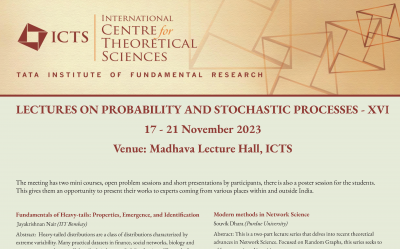India has a rich and long heritage in probability theory and stochastic Processes. Indian researchers, working both within India and abroad, are making quality contribution to the subject individually as well as collaboratively. To sustain this effort it is imperative to expose the young research scholars of India to the latest techniques and advances in the subject as well as increase the interaction between researchers in India. In order to achieve this and create collaborative probability groups within India, we believe that there is a need to have annually organized workshops.
Towards this, Lectures on Probability and Stochastic Processes, an annual workshop was started in 2006. It is designed to have two mini-courses on topics of recent interest given by experts in the respective areas. These courses are expected to expose the participants to the important problems being considered in the current literature, as well as the available techniques to work with them. A large audience, which includes research scholars and young PhDs from different institutes and universities of India, as well as few foreign participants, are invited to the workshop. It is expected that this gathering will initiate collaborative work across different research centres of India. To facilitate this activity, the workshop has sufficient time for sessions, where researchers can pose and discuss problems that can be of interest to others in the audience.
The meeting has two mini courses, open problem sessions and short presentations by participants, there is also a poster session for the students. This gives them an opportunity to present their works to experts coming from various places within and outside India.
The following two speakers will give the traditional 8 lectures of 50 minutes duration each. The details are given below.
-----------------
Speaker: Jayakrishnan Nair
https://www.ee.iitb.ac.in/~jayakrishnan.nair/
Electrical Engineering
IIT Bombay
Title: Fundamentals of Heavy-tails: Properties, Emergence, and Identification
Abstract: Heavy-tailed distributions are a class of distributions characterized by extreme variability. Many practical datasets in finance, social networks, biology and computer networks are well described via heavy-tailed distributions. The goal of these lectures is to formally define heavy-tailed distributions and their various sub-classes, understand their (often couter-intuitive) properties, describe several generative mechanisms for heavy tailed distributions that help explain their ubiquity in practice, and to introduce sound statistical tools for detecting and estimating heavy tails from data.
These lectures will be based on a recent book titled "The Fundamentals of Heavy Tails: Properties, Emergence and Identification," co-authored with Adam Wierman and Bert Zwart, published by Cambridge University Press. A pre-publication draft can be downloaded from: https://adamwierman.com/book/
Bio: Jayakrishnan Nair is an Associate Professor of Electrical Engineering at IIT Bombay. His research draws on tools from queueing theory, applied probability, game theory, and control theory to address performance evaluation and design issues in networks, service systems, and smart power grids.
--------
Speaker : Souvik Dhara
https://www.souvikdhara.com/
School of Industrial Engineering
Purdue University
Title: Modern methods in Network Science
Abstract: This is a two-part lecture series that delves into recent theoretical advances in Network Science. Focused on Random Graphs, this series seeks to address two pivotal inquiries:
Part 1: Unveiling the Influence of Local Structure on the Macroscopic Behavior
This segment explores the concept of "local-weak convergence" and harness its power to study the "giant component problem”. This classical problem has remarkable implications across domains such as epidemics, propagation of misinformation, and robustness of supply chains. We will also explore a fascinating connection between theory of convergence stochastic process and scaling limits of random graphs.
Part 2: Discovering Hidden Patterns within Networks
The second part focuses on an unsupervised learning problem, called community detection in networks. This topic has received significant attention due to its wide applications, ranging from identifying echo chambers in social networks to discerning brain regions predictive of psychosis onset. We will review key theoretical results in this area, and discuss recent advances on community detection with missing data and graph representation learning algorithms.
Bio: Souvik Dhara is an Assistant Professor at the School of Industrial Engineering at Purdue University. Previously, he has been a Schramm Fellow with a joint appointment between MIT Mathematics and Microsoft Research, Simons-Berkeley Fellow at the Simons Institute, UC Berkeley, and a Postdoctoral Research Associate at Brown University. He received his PhD in 2018 from the Department of Mathematics and Computer Science at Eindhoven University of Technology. Dr. Dhara’s research interest lies at the intersection of applied probability and network science. His primary focus is to develop theoretical foundations for stochastic processes and algorithms on large-scale networks. For instance, his interests include topics like epidemics on networks, graphons, community detection, graph representation learning. Dr. Dhara was awarded the Stieltjes Prize for his PhD thesis at the Dutch Mathematical Congress, 2019.
—————————————
Scientific Advisory Board:
Rajesh Sundaresan, Indian Institute of Science, Bengaluru.
Antar Bandyopadhyay, Indian Statistical Institute, Delhi Centre
Krishanu Maulik, Indian Statistical Institute, Kolkata
Kavita Ramanan, Brown University, Providence RI
Vivek Borkar, Indian Institute of Technology Bombay, Mumbai
Rajat Hazra, Universitet Leiden, Leiden
Nina Gantert, Technical University Munich, Munich
Rongfeng Sun, National University of Singapore, Singapore.
Srinivasa Varadhan, New York University, New York
—————————————
Past LPS Websites:
https://www.isid.ac.in/~antar/Conferences/LPS/index.html
https://www.isid.ac.in/~lps16/PastWebsites/LPS10/index.php
and
https://sites.google.com/view/lpsxv/home
—————————————
Past LPS organisers:
2006-2015 - Siva Athreya, Krishanu Maulik and Antar Bandyopadhyay
2015-2023 - Arijit Chakrabarty, Rajat Hazra, Manjunath Krishnapur, and Parthanil Roy
—————————————
Eligibility criteria: Masters, Ph.D., Post-doctoral fellows and faculty in Probability Theory and related fields.
We thank TIFR-CAM for co-hosting the workshop.
ICTS is committed to building an environment that is inclusive, non-discriminatory and welcoming of diverse individuals. We especially encourage the participation of women and other under-represented groups.
 icts
icts res
res in
in

